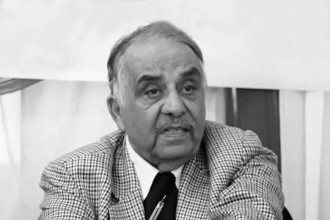-1712556366.jpg)
Nepal's Finance Minister, Barsaman Pun, has urged development partners to increase investment in sectors that create jobs and boost productivity in Nepal. He made this request during the World Bank's South Asia and Nepal Development Update, 2024 launch event held on Friday.
The Minister highlighted Nepal's positive performance compared to other South Asian countries. However, he emphasized the need for programs that create jobs within Nepal due to the high number of young people emigrating due to a lack of job opportunities. He pointed out the contrasting situations of high job demand in the infrastructure sector and young people leaving the country for work and education. To address this, he stressed the importance of creating jobs and productivity within the country itself. He requested development partners to increase resources to achieve this goal. He also expressed his belief that the World Bank's report would be helpful in Nepal's policy formulation.
Minister Pun stated that the government's top priority and focus is to facilitate economic activities. He expressed hope for economic recovery by the end of the current fiscal year. He explained, "Due to lower revenue collection, the government is prioritizing expenditure and trying to increase capital expenditure. We have adopted necessary policies to maintain fiscal stability in the long run."
He mentioned working closely with the World Bank and other development partners to improve the effectiveness and efficiency of public investment. He cited the implementation of the National Project Bank as a noteworthy example of this collaboration. The Minister acknowledged the World Bank's assistance in helping the Ministry of Finance and other government bodies develop a broader capacity for economic forecasting. He expressed his hope that this World Bank initiative will provide a more realistic macroeconomic framework in the future.
Furthermore, he informed the audience about the government's preparations for the third investment summit. He said this summit will showcase Nepal as an emerging destination for global investors. He elaborated, "This will particularly serve as a platform to showcase the potential of Nepal's dynamic investment landscape in green energy, tourism, agribusiness, and especially the IT sector." According to him, the government will ensure necessary safeguards and protections to facilitate a smooth and efficient ecosystem for all investments in the country, including repatriation of profits and dividends. He concluded by saying, "Such a summit, along with policy improvements related to investment, will help attract significant investments and propel Nepal towards achieving the medium-term growth potential highlighted in the Nepal Economic Update report."
The Minister also informed the audience that Nepal is in the process of formulating the budget for the next fiscal year. He welcomed constructive suggestions from development partners and stakeholders for better policies and allocations to guide the current economic development. He expressed his gratitude to the World Bank, on behalf of the Nepali government, for its continuous support in various development areas, including research and publications on various topics impacting the economy.
The program featured a discussion on job creation prospects in Nepal, moderated by Dr. Resham Thapa, Head of the Central Department of Economics at Tribhuvan University. Panelists included former Finance Minister Dr. Yuba Raj Khatiwada, Revenue Secretary Dr. Ram Prasad Ghimire, Ms. Pramila Acharya Rijal, Founding President of the South Asian Women Development Forum, and the Swiss Ambassador to Nepal.
During the program, former Finance Minister Dr. Yuba Raj Khatiwada remarked that the World Bank's projection for Nepal's economic growth is a phenomenal number for the decade. He considered the World Bank's estimate of 3 to 3.5% economic growth for Nepal to be realistic. However, he expressed his belief that the overall manufacturing and industrial sectors, except for energy, haven't performed well. He said, "We are aware of this. Therefore, the chances of achieving at least half of the growth rate the Finance Minister spoke about in his budget speech are high. Secondly, achieving 5% growth for the next year is not an impossible task."
He suggested that Nepal could achieve the projected economic growth rate without much effort. "We can easily achieve that if we don't face any external or internal shocks. Once we cross 5%, that's when the shocks start kicking in," he explained.
Dr. Khatiwada further stated that Nepal wouldn't see a current account surplus if the country achieved high economic growth. He explained, "With high economic growth, you won't see a decline in debt and imports, and it might seem like the economy is balanced. To get on a high economic growth path, we need to drive exports."
World Bank's Lead Economist, Franziska Ohnsorge, acknowledged the rising development rates in South Asia, but pointed out that India is the primary reason behind the region being the fastest-growing one.
According to Ohnsorge, since March 2022, major central banks have raised their policy rates at the fastest and tightest monetary policy stance since the 1970s. She explained that most emerging markets and developing economies have handled this well, with the exception of a group facing balance of payment pressures (around a quarter). This has resulted in strong depreciation pressures, significant capital outflows, and a large rise in credit spreads. This is likely happening in other emerging markets and economically stressed developing economies. Ohnsorge also highlighted the role of the public sector as another cautionary factor behind South Asia's above-average growth.
-1712556365.jpg)
-1712556367.jpg)








